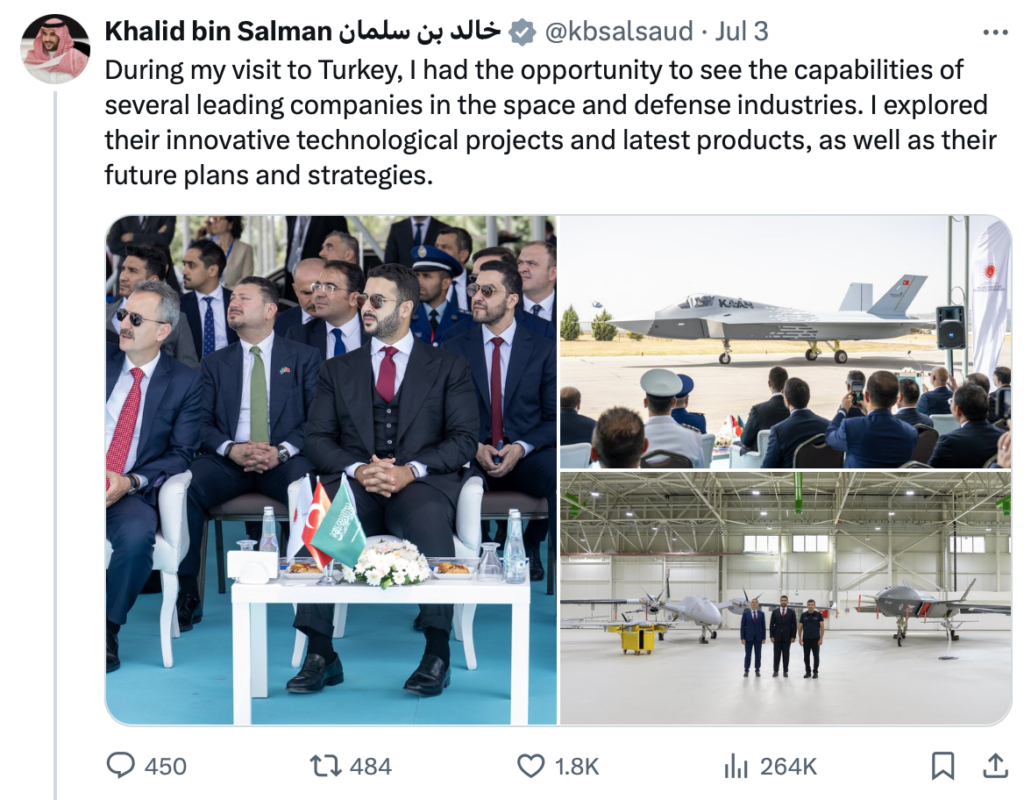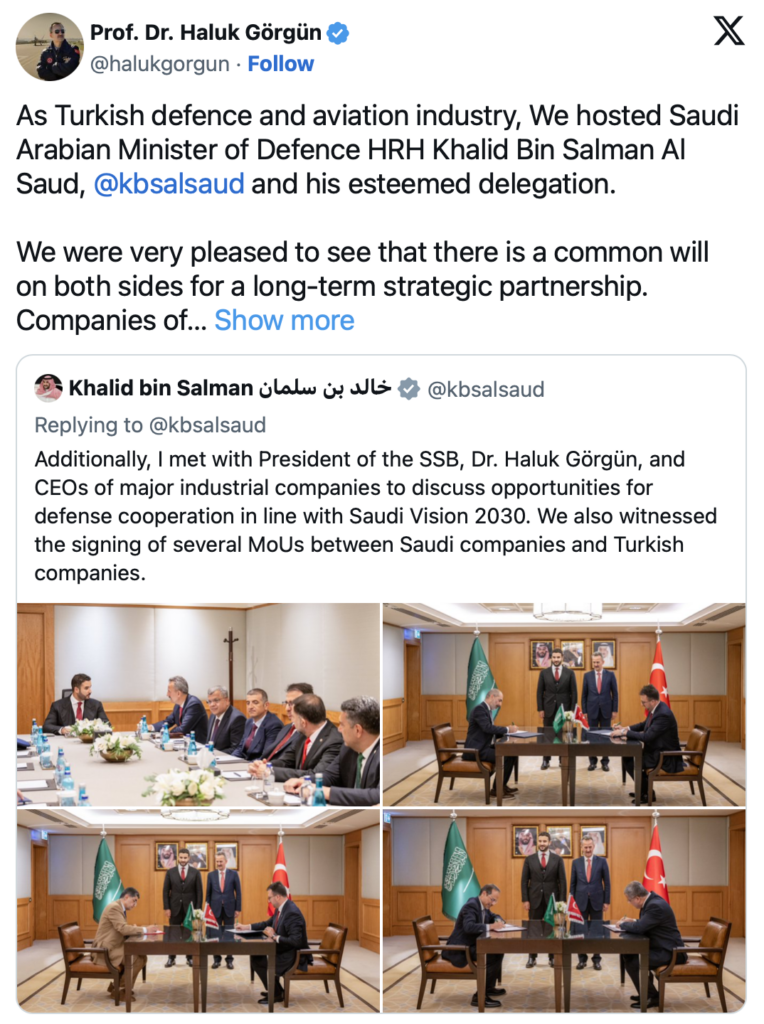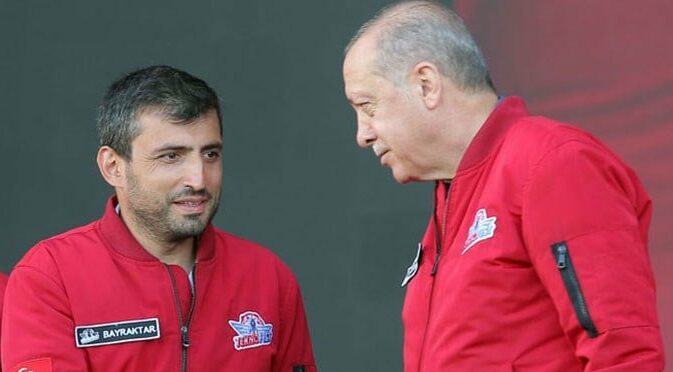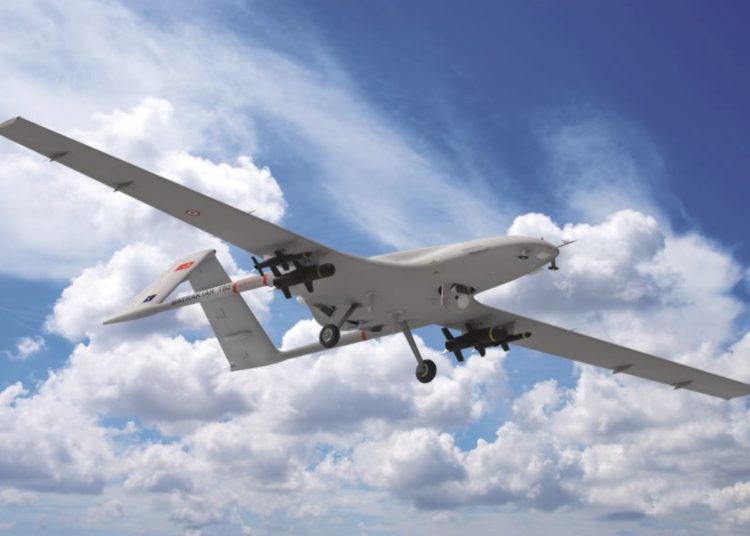Levent Kenez/Stockholm
Turkey plans to sell drones to economically disadvantaged African countries using financing from Saudi Arabia, with the drones to be manufactured there. Production, slated to start in 2026, will see engines imported from Turkey, while the airframes will be fully constructed in Saudi Arabia. Most of the wiring, communications systems and avionics will also be assembled in the new facility.
Mustafa Murat Şeker, deputy chairman of the Presidency of the Defense Industry (SSB), outlined Ankara’s plans for the sale of drones to more African countries using Saudi financing on during a July 10 parliamentary committee meeting. According to Şeker, Turkey is in discussions with Saudi Arabia about the production platform of Akıncı (a Turkish-made unmanned combat aerial vehicle) given the significant production volume involved. He emphasized that production in financially robust Gulf countries like Saudi Arabia is strategically beneficial, not only for meeting the region’s needs but also for addressing the financing gaps faced by other nations. Specifically, some African countries are interested in acquiring TB2 drones or other Turkish equipment, but their financial limitations pose a challenge. As a result, Turkey is developing solutions to produce drones in the Gulf and facilitate sales to third countries with Saudi financing, enhancing its defense industry export capabilities.
During President Recep Tayyip Erdogan’s visit to Saudi Arabia in July 2023, the two countries advanced their defense industry collaboration, formalizing several framework agreements. The Saudi Arabian Ministry of Defense also signed an export and cooperation agreement with Turkish drone manufacturer Baykar for the Akıncı model. The initial order will consist of 60 unmanned aerial vehicles (UAVs), with deliveries expected to take place between 2025 and 2026. The agreement includes the establishment of a UAV production line as well as provisions for the local production of munitions.

The Saudis particularly emphasized their desire for production to take place within their own country. Significant steps toward this goal were taken on July 4, during Saudi Defense Minister Khalid bin Salman’s visit to Turkey. During this visit, Saudi Arabian state-owned arms and defense equipment company SAMI signed three separate memorandums of understanding with Turkish firms to explore local production opportunities. According to announcements by the company, SAMI plans to establish production capabilities for UAV manufacturer Baykar in the kingdom. Additionally, SAMI and Turkish state-owned defense contractor Aselsan aim to jointly develop defense technologies in Saudi Arabia under a similar agreement. SAMI has also signed a preliminary agreement with Turkish space company Fergani.
In a statement made in June, Baykar CEO Haluk Bayraktar announced that the company plans to start production in Saudi Arabia in the next two years. Baykar’s facilities in Turkey currently produce 230 TB2 drones and approximately 50 Akıncı drones annually. The TB2 is already sold to 30 countries, while the Akıncı drone is exported to nine countries.
The factory to be built in Saudi Arabia will not be Baykar’s first overseas production facility. Haluk Bayraktar recently announced that construction has begun on a new factory near Kyiv, Ukraine, which will employ 500 people and focus on producing TB2 and TB3 UAVs. This development follows an agreement signed during Erdogan’s official visit to Kyiv in February 2022. Under this agreement, Ukraine allocated land for the facility for 49 years and offered various incentives. Additionally, parts and materials used in the UAV production will be exempt from duty, and all financial and personnel details of the new facility will remain confidential.

The agreement also includes the construction of a training center, and Baykar will benefit from a 10-year tax exemption as part of its investment incentives. The agreement is set to expire on January 1, 2035. For Baykar, which currently relies on engines from Ukrainian companies Ivchenko-Progress and Motor Sich for its military drones, the new production facility in Ukraine will offer logistical advantages and time efficiencies.
Selçuk Bayraktar, Erdogan’s son-in-law, is one of the owners of Baykar. President Erdogan sees Baykar as a family business and markets its products in many countries, especially in Africa. It is no secret that Erdoğan, his family members and his business associates benefit immensely from the defense industry and military equipment sales. Baykar takes advantage of all state facilities but also earns high profits in the local and international market with the sale of weapons, for which the only decision-maker is Erdogan. An important reason for choosing Turkish drones is that Turkey does not have a long export approval process unlike the US and the European Union.

Selçuk Bayraktar recently appeared on Forbes’ latest billionaire list. He is among the 27 Turkish billionaires who made it on to the prestigious list. As of today, Bayraktar’s net worth stands at $1.2 billion, securing him the 2,410th spot on the list. His brother, Haluk, follows closely behind, ranking 2,545th, with a net worth of $1.1 billion. The Bayraktar brothers’ wealth is reportedly attributed to their involvement in military drone production.
Selçuk Bayraktar has a majority share of 52.5 percent in Baykar, where he also holds the position of chairman and serves as the company’s chief technology officer. Meanwhile, his brother, Haluk, has a 47.5 percent stake in the company.












